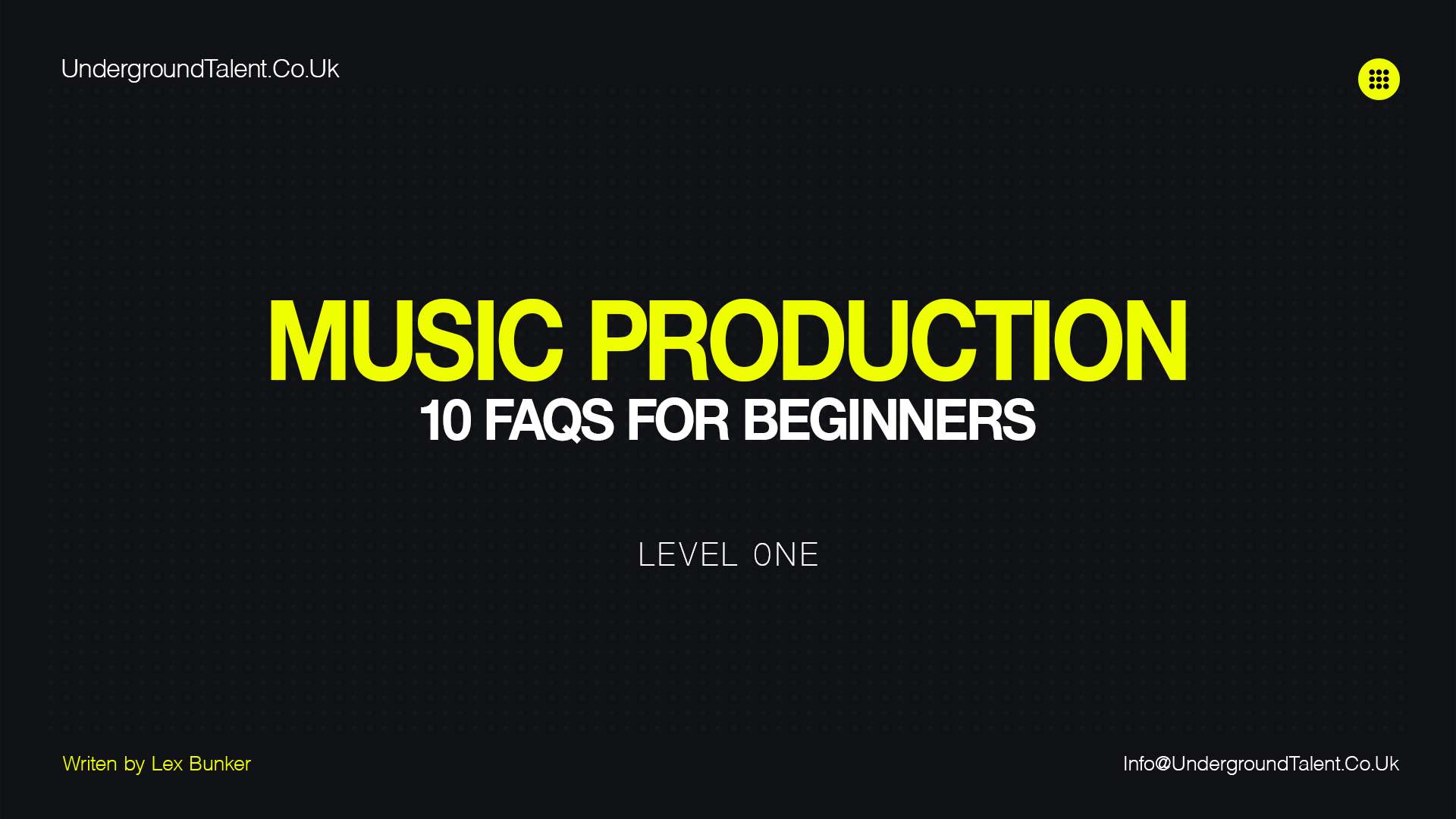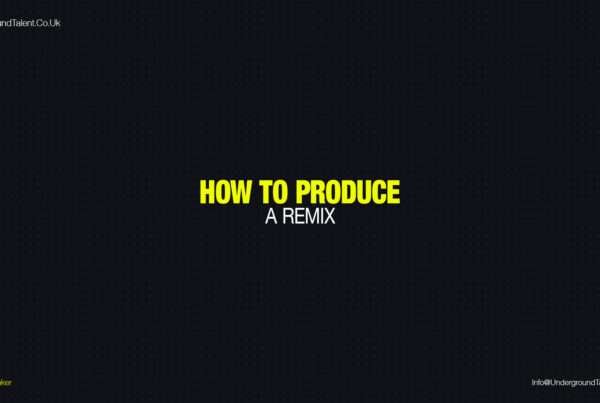Music production can be a daunting task for beginners. There are so many different factors to consider, from the type of equipment you need to the different software programs available.
10 Music Production FAQs for Beginners at Level One
by Lex Bunker
 If you’re thinking about getting into music production, you probably have a lot of questions. What equipment do you need? What software should you use? How do you get started?
If you’re thinking about getting into music production, you probably have a lot of questions. What equipment do you need? What software should you use? How do you get started?
In this blog post, we’ll answer some of the most frequently asked questions about music production, so you can start with your music production journey.
- How do I start producing music?
- Is music production hard?
- Can anyone be a music producer?
- What are the five stages of music production?
- Is music production a good career?
- Is it hard to write a good track?
- How long does it take to make a track?
- How long does it take to become a music producer?
- Can I teach myself music production?
- Do I need to study to become a music producer?
- What are some good music production schools or courses?
- What equipment do I need as a beginner?
Download Free: Techno Sample Pack: 64 One-Shot Samples + Producers Tips
How do I start producing music?
Start by setting up your workspace. This could be a dedicated music studio or a corner of your room. Make sure you have a comfortable place to sit and all your equipment is easily accessible. Then, open your chosen software and start exploring its features. Try creating some simple beats or melodies, and experiment with different instruments and sounds.
Once you’re comfortable with your software, you can start recording your own music. Start simple, maybe with a beat or a melody line, then gradually add more layers to your music. Remember that creating music is a process, and it’s okay to make mistakes. Each mistake is an opportunity to learn something new.
After you’ve recorded your music, you’ll need to mix it. This involves adjusting the volume levels of each track, adding effects, and making sure everything sounds good together. Again, this is a skill that you’ll develop over time, so don’t be discouraged if your first few mixes don’t sound perfect.
Finally, you’ll need to master your track. Mastering is the final step in the production process and involves polishing your track and preparing it for distribution. This might include adjusting the overall volume, balancing the stereo image, and adding the final EQ touches.
Throughout this process, remember to be patient with yourself. Music production is a complex skill that takes time to learn. Don’t be discouraged if things don’t come easily at first. Keep practising, keep learning, and most importantly, have fun with it. Your passion and dedication will shine through in your music.
Lastly, always be open to learning from others. There are numerous online communities and resources where you can connect with other music producers, get feedback on your work, and learn new techniques. This will not only improve your skills but also help you stay inspired and motivated in your music production journey.
Read Also: Techno Sample Pack: Unleash Your Creativity with Techno Shots
Is music production hard?
There is no easy answer to this question as it depends on a variety of factors. If you have experience with music production, then the process will be easier for you. However, if you are starting from scratch, then the learning curve can be quite steep.
That being said, there are a number of resources available that can help you learn the ropes of music production. There are online tutorials, books, and even classes you can take. With some time and effort, you can develop the skills necessary to produce high-quality music.
Don’t Miss: Techno Loops V1: High-Quality Analog Loops for Music Production
Can anyone be a music producer?
The music industry is ever-changing, and the role of the music producer has evolved considerably over the years. With the advent of digital technology, it is now possible for anyone with a computer to become a music producer.
However, while anyone can technically become a music producer, it takes more than just a computer to make great music. It takes creativity, passion, and a lot of hard work. If you’re thinking about becoming a music producer, make sure you’re prepared to put in the time and effort required to succeed in this competitive industry.
Don’t Miss: How to Stop Procrastinating & Finish Your Tracks?
Is music production a good career?
Music production is a highly sought-after career, but it’s not for everyone. It takes a lot of hard work, dedication, and talent to make it as a music producer. If you’re thinking about pursuing a career in music production, here are a few things to keep in mind.
First, you’ll need to be very proficient in music theory and composition. You’ll need to understand how to write, arrange, and produce songs. You should also be familiar with a wide range of musical styles and genres. Second, you’ll need to have a good ear for sound and know how to use audio production equipment. Third, you’ll need to be well-organized and able to work within tight deadlines.
If you have the talent and commitment necessary to be a music producer, it can be a very rewarding and exciting career.
Read Also: How to Promote Electronic Music | 10 Ways For Beginners
What are the 5 stages of music production?
The music production process can be broken down into five main stages:
- composition
- arrangement
- recording
- mixing
- mastering
Composition is the process of creating the melody and harmony for a song. This can be done by a single person or a team of composers.
The arrangement is the process of taking the composition and turning it into a full song, including adding instrumentation and arranging the various parts of the song.
Recording is the process of capturing the performance of the song, typically in a studio setting.
Mixing is the process of taking the recorded tracks and blending them together to create a finished song.
Mastering is the final step in the music production process, and it involves creating a master copy of the song that can be used for distribution.
Read Also: Stop Being a Perfectionist by Lex Bunker
How long does it take to produce a track?
The answer to this question depends on a number of factors, including the genre of music, the complexity of the song, and the experience of the songwriter.
A simple pop song can often be written in a matter of hours, whereas a more complex piece of classical music can take months or even years to complete. In general, it is safe to say that the average song takes a few days to write.
Read Also: DJ’s Guide to Local Gigging by Emma Yasumi
How long does it take to become a producer?
The short answer is that it takes a lot of hard work and dedication to become a music producer. However, there is no one-size-fits-all answer, as the amount of time it takes can vary depending on your experience, skill level, and other factors.
If you’re just starting out, it’s important to gain as much experience as possible. This means taking on any and every opportunity that comes your way, even if it’s not paid work. Once you’ve built up a strong portfolio, you can start charging for your services.
Becoming a music producer is a long and difficult process, but it’s one that can be extremely rewarding. If you’re passionate about music and have the drive to succeed, you can make it in this competitive industry.
Read Also: Brutalism by Erald (Free Sample Pack)
Can I teach myself music production?
Music production is a complex field that requires a deep understanding of both music and technology. While it is possible to teach oneself the basics of music production, it is very difficult to become a professional music producer without extensive training.
self-study can be a great way to learn the basics of music production. There are a number of excellent books and online resources that can teach you the basics of music theory, sound engineering, and production. However, it is important to remember that self-study can only take you so far. If you want to become a professional music producer, you will need to invest in formal training.
Don’t Miss: HZ Multiplier – VST for Free Download + Techno Tutorial
Do I need to study to become a music producer?
Whether or not you need to study to become a music producer depends on your goals and objectives. If you want to become a professional music producer, then you will need to study music production and learn about the various aspects of the role.
However, if you’re simply looking to produce music as a hobby, then you may not need to study at all. There are a number of resources available online that can help you get started, such as video tutorials and online forums.
Don’t Miss: Cinematic u-he Diva Presets | Metropol
Music production schools & courses: Any suggestions?
There are a number of good music production schools and courses available. Some of the better-known ones include the Berklee College of Music, the Musicians Institute, and the Audio Engineering Society. Each of these schools has a different focus and offers different benefits, so it’s important to do some research to find the one that’s right for you.
Berklee College of Music is one of the most respected music schools in the world. It offers a comprehensive education in music production, including classes in composition, recording, mixing, and more.
The Musicians Institute is a great choice for those interested in a career in music production. It offers a wide range of courses, from audio engineering to music business, and has a strong focus on hands-on learning. The Audio Engineering Society is the largest professional organization for audio engineers. It offers a variety of resources, including educational events, networking opportunities, and a wealth of knowledge from its extensive member base. While it doesn’t offer traditional courses, its events and resources can be invaluable for those interested in audio engineering and music production.
Apart from these, there are online platforms offering comprehensive courses in music production. Here are a few:
Coursera
This platform partners with universities and organizations around the world to offer online courses in a variety of subjects, including music production. For example, Berklee College of Music offers a series of online courses on Coursera that can culminate in a certificate.
MasterClass
This platform has a course led by music industry professionals like Timbaland and Deadmau5, where they share their creative process, techniques, and experiences in music production.
Udemy
Udemy is an online learning platform aimed at professional adults who want to add new skills to their resumes. There are many music production courses available from beginners to advanced levels.
Point Blank Music School
This online and physical school based in London offers a wide range of courses, from singing and songwriting to music production and sound engineering. They have won multiple awards for their courses.
Dubspot
This online school offers extensive training in a variety of DAWs (Digital Audio Workstations), including Ableton Live, Logic Pro, and others.
Before choosing a course, consider your current skill level, your learning style, your budget, and your career goals. This will help you find a course that’s the best fit for you. It’s also a good idea to read reviews or talk to past students to get a sense of what the course is like.
Don’t Miss: Techno Sequences for u-He Diva. Designed by Erald.
Music production equipment for beginners: What should I buy?
As a beginner music producer, you will need a few essential pieces of equipment to get started. These include a computer, software, audio interface, MIDI keyboard, and studio monitors.
A computer is the foundation of your studio. It will be used to run your music production software and host your audio files. A laptop can be used for music production, but a desktop computer will usually provide more power and be less likely to overheat.
Software is the next essential piece of equipment for music production. This is what you will use to create and edit your audio files. There are many different software programs available, so it is important to choose one that is compatible with your computer and meets your needs.
An audio interface is a device that connects your computer to your studio monitors and other audio equipment. This allows you to record and playback audio with high quality. There are many options available, from budget-friendly to professional-grade, so choose one that fits your budget and needs.
A MIDI keyboard is a controller that allows you to play and record music in your software. This is not strictly necessary, especially if you plan on primarily producing electronic music, but it can make composing and arranging music easier and more intuitive.
Studio monitors, or specialized speakers, are essential for accurately hearing your music as you produce it. Unlike regular speakers, studio monitors are designed to provide a flat frequency response, which means they don’t colour the sound. This allows you to hear your music as it truly is, making it easier to mix and master.
In addition to these essentials, there are other pieces of equipment that can be useful for music production. These include microphones (if you plan on recording vocals or live instruments), headphones for detailed listening, and acoustic treatment for your room to ensure accurate sound.
Remember, starting out with music production doesn’t mean you have to have all the high-end gear right away. As a beginner, the most important thing is to learn the basics and develop your skills. You can always upgrade your equipment as you progress and as your budget allows.
Read Also: What Is Audio Mastering? 21 Questions About Mastering
Conclusion for learning music production.
In conclusion, music production is a complex and nuanced field that requires a great deal of knowledge and skill to master. However, with the right resources and a bit of practice, anyone can learn the basics of music production and begin creating their own songs.
If you’re interested in learning more about music production, be sure to check out our other articles on the subject. And if you have any questions, feel free to reach out to our team of experts for help.
Read Also: How to Promote Electronic Music | 10 Ways For Beginners
Connect with Underground Talent
You can find us on Facebook, Soundcloud, and Instagram. We encourage you to share your thoughts and feedback on this article, and we look forward to continuing to educate and inform you on this important topic.
You can find us on, and, and don’t hesitate to reach out to us if you have any questions or comments by email at info@undergroundtalent.co.uk.
Don’t miss out on the latest and greatest underground talent! Subscribe to our YouTube channel now and stay on top of the freshest and most exciting new acts in the techno scene. Click the subscribe button and join our community of techno music lovers today!
Don’t Miss: House Music – An In-depth Guide to Music Production
And Always Remember…
Have Fun & Be Creative!




